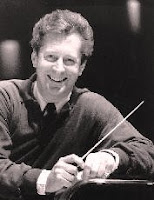Now I’m a believer ……
 Fellow blogger Jessica Duchen has an interesting piece about Barry Wordsworth’s decision to pull out of conducting the premiere of a new work by Andrew Gant because Wordsworth (left) ‘did not believe’ in the piece. This prompts Jessica to asks: ‘Can you imagine the works that would never have been performed if their conductors had decided not to believe in them?’
Fellow blogger Jessica Duchen has an interesting piece about Barry Wordsworth’s decision to pull out of conducting the premiere of a new work by Andrew Gant because Wordsworth (left) ‘did not believe’ in the piece. This prompts Jessica to asks: ‘Can you imagine the works that would never have been performed if their conductors had decided not to believe in them?’ Yes, quite. But it is also worth taking a minute to consider exactly what caused Barry Wordsworth’s disbelief. Was it the alleged lack of inspiration, or was it something else? The title of the work itself, A British Symphony, may stretch belief for some. But let’s give it the benefit of the doubt, the symphony could be a celebration of our wonderfully multi-cultural country.
Well, it could be. But it was commissioned by Rodney Atkinson who was due to attend the cancelled premiere with a group of friends. Now neither the Times article which broke the story nor Jessica give anything more than a passing mention to Rodney Atkinson, who is brother of actor Rowan. But there is an interesting story about the political beliefs, and friends, of the work's patron. He founded The Campaign for United Kingdom Conservatism in 1994, wrote Fascist Europe Rising in 2002, and co-authored with Norris McWhirter the book Treason at Maarstricht. McWhirter, who died in 2004, himself formed “The Freedom Association” in the 1970’s, which went on to mount legal challenges against the trade union movement (notably in the bitter Grunwick dispute) and the Campaign for Nuclear Disarmament in the UK, and the EEC in Brussels, and is still active.
But I am sure that is just interesting background, and has nothing to do with what Barry Wordsworth describes as his "concerns from the start". As Jessica says: "Can you imagine the works that would never have been performed if their conductors had decided not to believe in them?". So let’s end by celebrating all those musical masterpieces where the conductor sang “Now I'm a believer. Not a trace of doubt in my mind” before launching in to the premiere. Here is my list for starters, additions welcome:
* The Decembrists by Yuri Shaporin premiered in 1952 by the Bolshoi Opera. A reworking of Meyerbeer’s Les Hugenots with a revised plot to meet the ideological requirements of the Communist Central Committee’s Department of Agitation and Propaganda (Agitprop). To make the story more believable history was rewritten, and the officers who, in December 1825, demonstrated and were massacred on Senate Square, became working class radicals.
* Junge Marschiert (Youth Marches), which was played to the true believers as the combined forces of the dreaded SA and SS paraded down Wilhelmstraße in Berlin on January 30th, 1933 to celebrate Hitler's appointment as Chancellor. The march was composed by the subject of my recent article, Harvard alumni Ernst Hanfstaengl.
* The Great Friendship by Vano Muradi, which had as its hero Stalin’s best friend Sergo Ordzhonikidze. Unfortunately the Communist Central Committee did not believe the plot, and it turned out that Ordzhonikidze had been eliminated by Stalin himself. In a piece of political Monkee business the opera was branded as Formalist in a 1948 decree, together with the works of several rather more talented composers. This infamous decree had profound impacts on the careers of Shostakovich, Prokofiev, Khachaturian, Myaskovsky and Shebalin.
Bravo Barry Wordsworth! - and now read about another musician who was not afraid to stand up for his beliefs
Any copyrighted material on these pages is included for "fair use", for the purpose of study, review or critical analysis only, and will be removed at the request of copyright owner(s). Report broken links, missing images and other errors to - overgrownpath at hotmail dot co dot uk









Comments
UPDATE, 5.55pm: Over at On An Overgrown Path, Pliable casts some extremely interesting light on the background to the Gant/Wordsworth story. It seems that the political leanings and writings of the work's commissioner, R Atkinson frere, may be not irrelevant and will be highly uncomfortable, not to say repugnant, to much of the British arts community. Pliable applauds Wordsworth's decision. He may be right.
Barry Wordsworth went to my school! He is a few years older than me, but was actually in my brother's class.
The school was Glyn County Grammar in Epsom, and it had some interesting former pupils. Another one was David Hemmings.
It still looks like hard luck for the composer - but now one might start to wonder whether he believed in his own work, written to such a commission...?
I'm not sure about the point you're making in this post.
Are you saying there's an equivalence between "A British Symphony" and works celebrating totalitarianism?
You haven't produced much evidence to support the parallel.
The person who commissioned the symphony is a Eurosceptic. So what?
Do patrons have to undergo some sort of ideological test before they can commision a piece of music?
Also, what would be wrong in a symphony celebrating Britain, France, Ireland, Finland, or any other country?
It's a shame that you imply there's something sinister in it. Unless you know something we don't?
Will we ever be able to hear this piece now, to make up our own minds?
Of course if you're right and Barry Wordsworth was not comfortable with the piece for political reasons, then of course, interest in it is only likely to grow.
Best wishes,
Peter Reavy